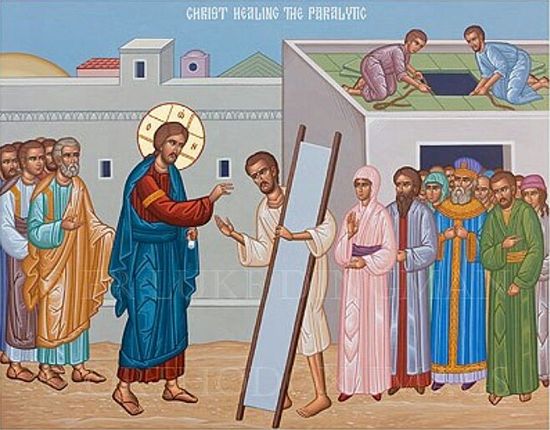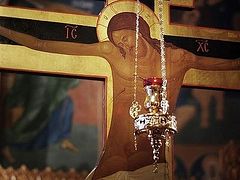Hebrews 1:10-2:3; Mark 2:1-12
Lent this year is not what any of us had anticipated. Prudence about our own health and concern for the elderly and those with underlying conditions will lead to changes in our habits and routines. Some of us will have to adjust to new schedules at work and school. Many events and trips have been cancelled. At least until further notice, the schedule of services and other events in our parish will remain the same. None of us has the ability to control the course of a global pandemic, but we all have the ability to take the steps that we can in order to be good stewards of our own health and to decrease the likelihood of spreading disease to others. Loving our neighbors as ourselves requires nothing less.
In doing so, we must not become overwhelmed by fear or fall into panic about the current situation, for absolutely nothing “can separate us from the love of God which is in Christ Jesus our Lord.” (Rom. 8:39) He will be with us “always, even to the end of the world.” (Matt. 28:20) Lent is a season of preparation to follow the Savior to His Cross and empty tomb. He entered fully into our suffering and pain to the point of death in order to bring us into the joy of eternal life through His glorious resurrection on the third day. We must not doubt, then, that the Lord will be with us and our loved ones throughout even the most difficult circumstances of our lives. That is true regardless of what particular set of challenges we may face at any point. We must use matters beyond our control to grow in humble faith, for they quickly reveal our weaknesses and limitations. Such challenges remind us to “commend ourselves and one another, and our whole life, unto Christ our God” for the accomplishment of His gracious purposes both in this life and in the world to come.
Before such great trials, we are all like the paralyzed man in today’s gospel lesson. By enabling him to stand up, carry his bed, and walk home, the Savior healed him in ways that even the best religious teachings or laws could never have done. Christ restored him to strength and freedom by making the man a participant in His fulfillment of the human person in the divine image and likeness. He healed the corruption of the man’s soul by forgiving his sins and healed his body as a visible sign that His salvation extends to every dimension of our existence. Our Savior has a human body and does not denigrate or ignore our physical infirmities. As the Lord’s many healing miracles demonstrate, His compassion for His suffering children knows no bounds.
On this second Sunday of Great Lent, we commemorate St. Gregory Palamas, who defended the experience of monks who, in the stillness of prayer from their hearts, saw the Uncreated Light of God. The eyes of their souls were cleansed and illumined such that they were able to behold the Divine Glory that the Apostles beheld at the Transfiguration of the Lord on Mount Tabor. St. Gregory taught that to know God is to participate in His gracious divine energies as we are transformed in holiness in every aspect of our existence. He proclaimed that our calling is to know and experience God, not as an abstract idea or concept, but through union with Him that sanctifies every dimension of the human person. Such spiritual experience is ultimately beyond rational definition, for it is truly an encounter with the great “I AM” of the Burning Bush.
The Savior overcomes the paralysis of our souls by sharing His life with us, by making us “partakers of the divine nature” through grace. He offers not merely a message or an idea, but Himself as the God-Man Who restores us fully in the divine image and likeness. Christ was born, lived, died, and rose from the grave with a body every bit as human as ours. It should not be surprising, then, that His holiness shines brightly in the world as we know it. Recall that Moses’ face was radiant with light after he encountered God on Mt. Sinai (Ex. 34:29) and that flames of fire appeared upon the heads of the Apostles at Pentecost. The faces of many Saints throughout the history of the Church have also been radiant with holy light. The Lord Who left an empty tomb at His resurrection intends to make us shine with holiness in every dimension of our humanity. Already as we live and breathe in a world of sickness and death, He invites us to embrace His gracious healing of our souls, and of our entire lives, as fully as possible.
Doing so requires that we share in His life in practical, tangible ways. The spiritual disciplines of Lent all involve what we do with our bodies. That should be obvious with fasting and almsgiving, but it is also true with prayer, for prostrations, making the sign of the cross, and other ways in which we comport ourselves physically help us to open our hearts to God. The journey of repentance involves the whole person, for what we do with our bodies directly impacts our souls. Baptism, Chrismation, the Eucharist, and the other holy mysteries require water, oil, bread, wine, and various physical gestures. Our salvation is not a retreat from the body, but its fulfillment in God.
Lenten practices will not enable us to escape from the current public health crisis. They will, however, strengthen us to open our souls more fully to the gracious divine energies of our Lord. The One Who conquered death by death will enable us to live faithfully amidst whatever challenges we face in a world that has not yet become the fullness of the Kingdom. If we will only embrace His healing of the human person, the Savior will deliver us from the paralysis of soul that keeps us bound to the fear of grave. As we unite ourselves to Christ from the depths of our hearts, He will illumine the eyes of our souls such that we, too, may shine with the light of His holiness. That is what it means to know, experience, and share in the life of God. When we do so, our lives will bear witness to the Lord’s healing such that our neighbors will be amazed and glorify Him, “saying, ‘We never saw anything like this!’”




